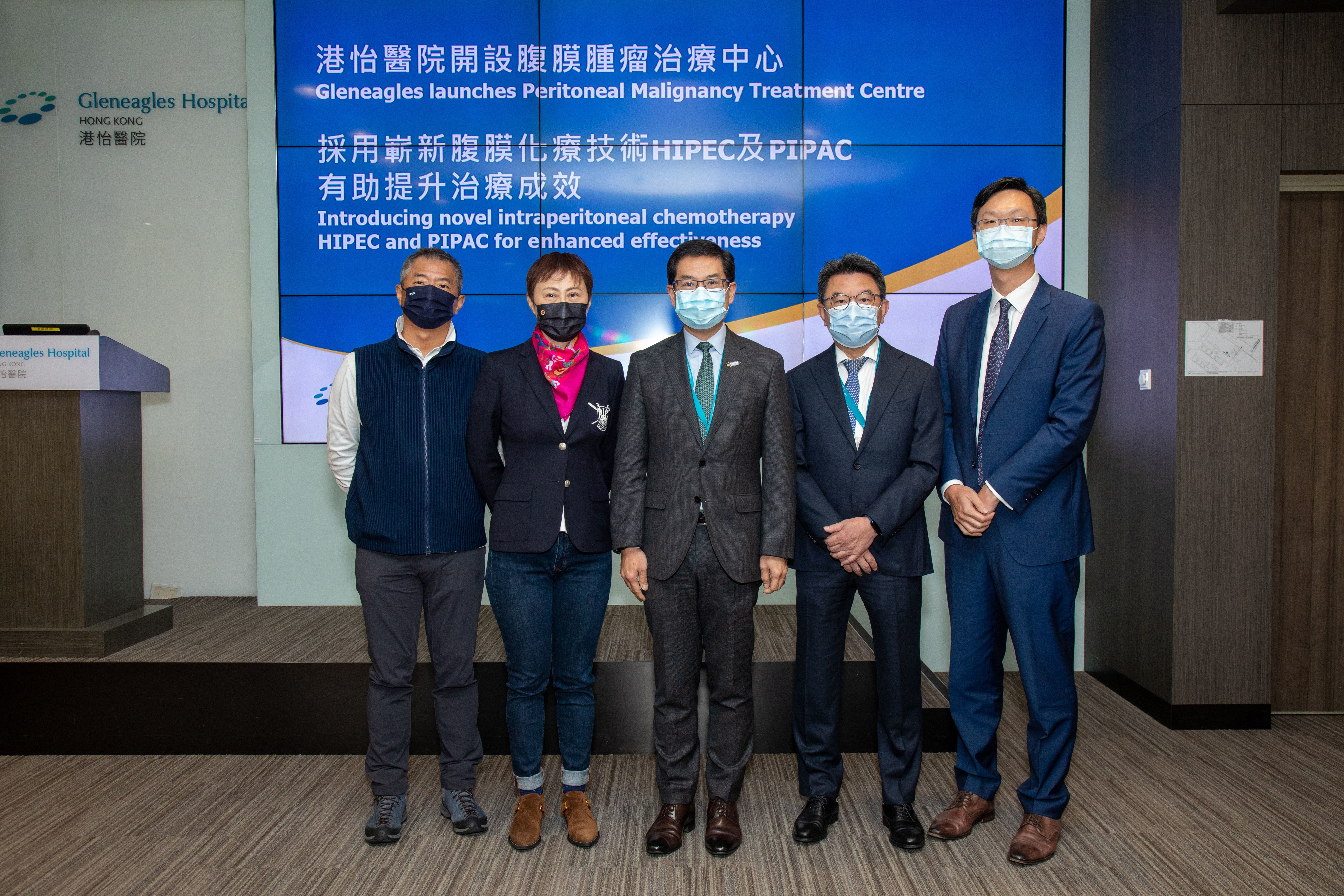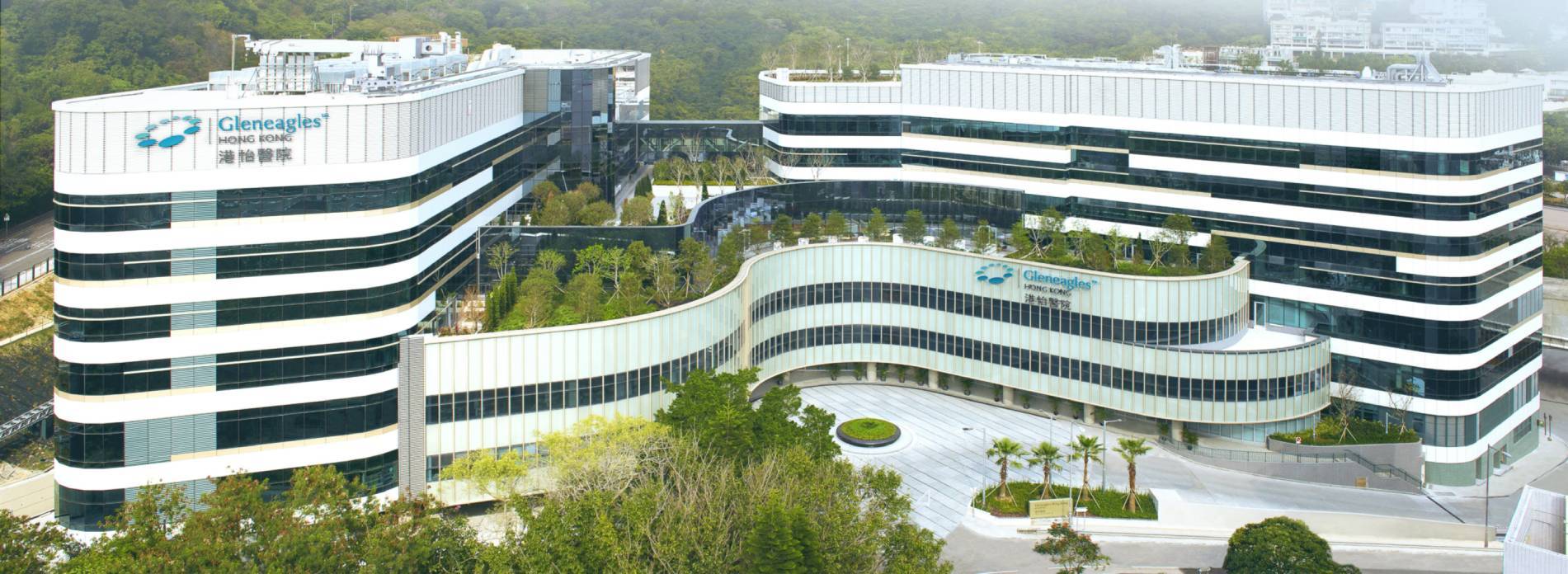Gleneagles launches Peritoneal Malignancy Treatment Centre Multidisciplinary team introduces novel intraperitoneal chemotherapy for enhanced effectiveness

Dr Kenneth Tsang, Chief Executive Officer of Gleneagles (middle), Dr Ng Tong-yow, Director of the Peritoneal Malignancy Treatment Centre (2nd from right), Dr Jeremy Yip, Deputy Director of the Peritoneal Malignancy Treatment Centre (1st from right) and patient Mrs Lo who underwent HIPEC treatment at Gleneagles (2nd from left) with her husband (1st from left)
(3 December 2021 – Hong Kong) Gleneagles Hospital Hong Kong’s (Gleneagles) Peritoneal Malignancy Treatment Centre introduces novel intraperitoneal chemotherapy procedures, including Hyperthermic Intraperitoneal Chemotherapy (HIPEC) and Pressurized IntraPeritoneal Aerosol Chemotherapy (PIPAC), to provide more effective treatments to patients with peritoneal cancer.
Launched in April 2020, Gleneagles’ Peritoneal Malignancy Treatment (PMT) Centre is the first of its kind in Hong Kong. Dr Kenneth Tsang, Chief Executive Officer of Gleneagles, said, “In addition to our advanced radiotherapy facilities, we have also launched a centre dedicated to serving patients with peritoneal metastasis. Our experienced multidisciplinary medical team provides patients with comprehensive diagnostic services and personalised treatments.” He added, “The PMT Centre has been striving to introduce new and advanced treatments of peritoneal cancer, including HIPEC and PIPAC, to enhance the effectiveness of our treatment plans. Since its launch, dozens of peritoneal cancer patients have undergone these treatments at our Centre.”
Dr Tsang also shared insights into the approach Gleneagles adopted in its cancer services and said, “Our multidisciplinary team approach has helped us provide patients with comprehensive and personalised cancer treatment services. Tumour boards comprising multidisciplinary experts are also in place for different specialties. Taking the Gynaecological Oncology Tumour Board as an example, its members include specialists in gynaecological oncology, clinical oncology, medical oncology, general surgery and pathology. The members meet regularly to discuss the latest treatments and discuss individual cancer cases at the hospital to ensure that each patient receives the most appropriate and high-quality care.”
Cytoreductive surgery and HIPEC help reduce peritoneal recurrence
Peritoneal cancer can arise from the peritoneum or spread to the peritoneum commonly from the malignancy of the pancreas, stomach, colon, ovarian and appendix. Most early peritoneal cancers have no symptoms, while common symptoms when the disease is fairly advanced include loss of appetite, severe malnutrition, repeated vomiting, bowel obstruction, and ascites. Some patients may need to obtain nutrients via total parenteral nutrition. Treatments for peritoneal cancer include conventional tumour excision and systemic therapies such as chemotherapy, and catheter-based intraperitoneal chemotherapy. However, not all cancer cells may be removed by surgery itself as peritoneal metastasis affects an area, and there may even be a higher chance of recurrence. Currently, the disease may not be completely cured through chemotherapy, targeted therapy and immunotherapy, and some patients can only undergo palliative treatments.
The PMT Centre has been adopting cytoreductive surgery combined with HIPEC to provide treatment for patients with peritoneal cancer. Cytoreductive surgery and HIPEC is a one-time combined treatment during which heated chemotherapy is applied directly into the abdomen after the surgeon removes all visible tumours while the patient is still under anaesthesia. The drug solution at a high temperature of 42 degree Celsius increases the penetration of drugs into the peritoneal cavity to reach cancer cells. The drug solution is heated and recirculated in the abdomen via a Hyperthermia Pump.
Compared with conventional intravenous chemotherapy, the increased drug concentration enhances the susceptibility of cancer cells during the HIPEC procedure, and high temperature increases the penetration of drugs to reach and kill the cancer cells, facilitating more effective treatment outcomes. As chemotherapy is confined within the abdominal cavity, there will be relatively fewer side effects. Medical studies found that HIPEC could effectively improve the survival rate of patients with ovarian cancer, gastric cancer or colorectal cancer, while patients who received HIPEC treatment lived 12 months longer than patients without undergoing HIPEC. The treatment can even help reduce the recurrence of peritoneal cancer.
High efficacy of HIPEC in treating ovarian cancer with survival rate exceeding 90% in selected patients
HIPEC is one of the procedures applicable to ovarian cancer in peritoneal malignancy treatment. According to the statistics from the Hong Kong Cancer Registry of the Hospital Authority, ovarian cancer ranks second among the most common gynaecological cancers in the city. In 2018, 664 new ovarian cancer cases were recorded. Three out of every four ovarian cancer patients had the disease spread to the peritoneum at diagnosis. In January 2018, Gleneagles performed Hong Kong’s first HIPEC treatment in an ovarian cancer patient. So far, over 30 ovarian cancer patients have undergone HIPEC treatment at Gleneagles.
Dr Ng Tong-yow, Director of the Peritoneal Malignancy Treatment Centre, said, “Taking the treatment of stage 3 ovarian cancer as an example, some studies found that, comparing to patients without undergoing HIPEC, the median recurrence-free survival for those who had received cytoreductive surgery and HIPEC was 3.5 months longer while the median overall survival was 12 months longer.” “Generally, most visible tumours can be removed through cytoreductive surgery. Among the relevant ovarian cancer cases at Gleneagles, 94% of patients showed no residual disease or only residual nodules measuring less than 2.5mm after surgery. The median duration of the surgery is about 6.5 hours and patients can be discharged as soon as after 5 days. According to the Centre’s statistics, more than 65% of patients have shown no evidence of disease, with the survival rate reaching 91%, demonstrating the significant efficacy of HIPEC in the treatment of ovarian cancer”, he continued.
PIPAC as novel palliative treatment of peritoneal metastasis enhances patients’ quality of life
In addition to HIPEC, the Centre has recently introduced the innovative PIPAC treatment. Dr Jeremy Yip, Deputy Director of the Peritoneal Malignancy Treatment Centre, said, “PIPAC is a minimally-invasive procedure which takes only about an hour, and patients can be discharged on the same day. This repeatable treatment is performed every six weeks, usually as a complementary procedure to systemic chemotherapy. Studies showed that PIPAC can relieve symptoms of peritoneal metastasis such as lessening pain, ascites and obstructive symptoms, and reduce the side effects of chemotherapy, and thus help improve patients’ quality of life.” Dr Yip explained that during the PIPAC treatment, the surgeon would insert a micropump into the patient's abdomen, administering pressurised chemotherapy aerosol into the peritoneal cavity. Meanwhile, the procedure would be monitored through a laparoscope. Directly injecting the drug into the peritoneal cavity can increase the drug penetration to eliminate the tumours enhancing the efficacy.
Dr Yip reminded that as individual patient’s actual condition is different, the effectiveness and suitability of HIPEC and PIPAC may vary. Patients should discuss with their doctor to choose the treatment suitable for them.
Gleneagles Hospital Hong Kong
Located at Wong Chuk Hang on Hong Kong Island South, Gleneagles Hospital Hong Kong (Gleneagles) is a multi-specialty private hospital, providing 500 beds, cutting-edge medical technologies and a comprehensive range of clinical services spanning more than 35 specialties and subspecialties. As Hong Kong’s top-notch private teaching hospital, Gleneagles also contributes to the training and development of healthcare professionals and advancement of clinical research. Gleneagles is a joint venture between IHH Healthcare and NWS Holdings Limited, with The University of Hong Kong as its exclusive clinical partner.
Gleneagles Hospital Hong Kong is part of IHH Healthcare, one of the world’s largest healthcare providers. With its full spectrum of integrated services, dedicated people, reach and scale, and commitment to quality and safety, IHH aspires to be the world’s most trusted healthcare services network, united by a single purpose: to touch lives and transform care. More information on Gleneagles Hospital Hong Kong can be found at https://www.gleneagles.hk/.





